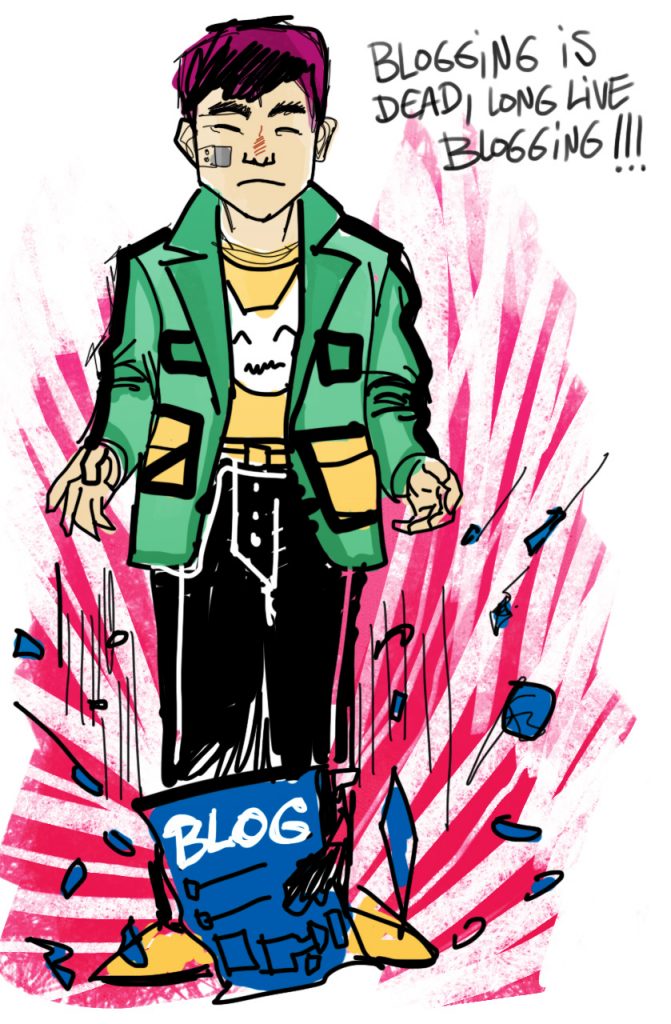
By Mars Dorian, {grow} Contributing Columnist
When I started blogging about five years ago (back when we felt smart with dumb phones), I devoured every blog post about how to write epic blog posts.
I stalked the usual suspects online, e.g. Problogger, Copyblogger and the masters, looking for little hints on crafting highly-viral articles that would make people hit the share button like they stole the keyboard.
I enslaved myself to a bi-weekly publishing schedule and implemented everything that I had learned. Some posts attracted up to 200-300 retweets and dozens of compliments, attracted clients, and helped me built my online career.
And for a while, it was good, because I followed the ‘proven’ formula of the wise ones that made money teaching others how to make money with blogging.
But the economics of blogging don’t work the same way any more.
How successful blogging worked years ago
- Write 2000-3000 words ‘epic’ evergreen how-to blog posts that worked as clinkbait, i.e. articles that would be linked and shared across other blogs and social media platforms for months, if not years, to come.
- Make each post solve a specific problem and go deeeep.
- Make the post all about the reader/customer.
I followed the formula for years, but then, about two years ago, the shares and comments declined. And so did the clients.
So I decided to wind down the blogging game and focus solely on client acquisition and networking. For some people, blogging is still a viable option, but I believe the diminishing returns on blogging are imminent for everyone.
Why blogging loses its relevance
1) Epic evergreen blogposts are obsolete.
We’re now living in the digital publishing landscape, and it has changed our information intake forever. If you want to go deep into an area of expertise, you can buy short, cheap (self-published?) ebooks on your chosen topic, take a course on skillshare.com or udemy.com and get a multimedia experience, even on mobile. Something which wasn’t as popular five years ago.
2) Blogger interaction has moved to social media networks.
Back in the day, Twitter and Facebook were solely networks to share your blog posts, while the interaction happened on your blog, in the form of (many) comments. Those roles seemed to have switched.
3) Video killed the blogging star.
Vine and now Meerkat allow you to shoot quick vids that are easy and fun to consume. With our attention shrinking to nano-levels, pure text-based content becomes as appealing as a face hug with a steel wall. Text means work, video means fun. I often catch myself clicking on Twitter and Facebook vids, even if I’m not interested in the headline. Just the idea of a short motion picture which I can consume passively satisfies my lazy soul. I prefer writing of course, but this is the future.
4) People don’t fully read blog posts.
Especially not the longer ones. A lot of followers who are long-time readers of mine told me they were scanning and skipping my posts. To be honest, that hurt a little. There I was in my creative cave, worrying about word choice and blog structure, and then those schmucks go National Skipping Day on me. When I ask around my networks, I get the same answers: readers fly over the articles. Lack of time. Lack of attention.
I’m sure there are plenty other of reasons, but these are the major ones I found. In 2014, I wrote an article here on Grow about quitting blogging, but I’ve picked it up again, just with a wayyy different focus. Back in 2009, it was a useful marketing tool to attract new clients, nowadays, it’s a personal diary to build a stronger connection with my existing follower base.
What my blog post in 2015 looks like
1) I write short, 500-750 word posts with a single lesson, e.g. what I learned from self-publishing my first book. No evergreen, in-debth blog posts for me anymore. That deep content will be turned into ebooks that I charge money for.
2) I get away from the instructional how-to manual style and turn into a Mars Dorian tabloid. It sounds negative, but hear me out. I’ve once written that since 2014, style matters more than substance, because algorithm and wikipedia can give you all the information you need, but they have zero emotional pulling power. Humans always crave emotion. A wikipedia page gives you info, but I can make you feel something.
3) I relate everything that I write about to me. This again sounds counterproductive, because the usual advice is always to ‘Make it about the reader/customer’. I think that’s true for products you ask money for, but if you publish a free post and you have a strong voice in your market, people want to know what YOU have to say about your chosen topic. There’s tons of entrepreneurial advice on Forbes, Fast Company and the like, but people return to Gary Vaynerchuk because they want HIS opinion on entrepreneurship.
In my estimation, the golden age of blogging has passed. Endless choices of social media networks, quick video apps, and the continuing attention-loss are all to blame, but I’m still looking forward to the future. I’m turning the former five star blog post meal with its five courses into an easy-to-digest happy meal. Not as juicy, but just enough satisfying to stay relevant.
How important is blogging to you in 2015? Has its relevance ever shifted for you?

which you can check out on Amazon for just $2.99! Consider his artwork for your next project: http://www.marsdorian.com


